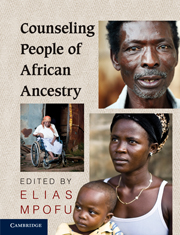Book contents
- Frontmatter
- Contents
- Contributors
- About the Editor
- Editorial Board
- Foreword
- Preface
- Acknowledgments
- PART 1 FOUNDATIONS OF COUNSELING IN AFRICAN SETTINGS
- PART 2 CONTEXTS OF COUNSELING
- PART 3 COUNSELING APPLICATIONS
- PART 4 THE FUTURE OF COUNSELING IN AFRICAN HERITAGE SETTINGS
- 20 Counseling in African Cultural Heritage Settings: The Challenges and Opportunities
- Counseling People of African Ancestry Multiple Choice Answers
- Index
20 - Counseling in African Cultural Heritage Settings: The Challenges and Opportunities
Published online by Cambridge University Press: 05 August 2011
- Frontmatter
- Contents
- Contributors
- About the Editor
- Editorial Board
- Foreword
- Preface
- Acknowledgments
- PART 1 FOUNDATIONS OF COUNSELING IN AFRICAN SETTINGS
- PART 2 CONTEXTS OF COUNSELING
- PART 3 COUNSELING APPLICATIONS
- PART 4 THE FUTURE OF COUNSELING IN AFRICAN HERITAGE SETTINGS
- 20 Counseling in African Cultural Heritage Settings: The Challenges and Opportunities
- Counseling People of African Ancestry Multiple Choice Answers
- Index
Summary
OVERVIEW. This chapter integrates and synthesizes many elements of the interdisciplinary discourse, regarding counseling people of African ancestry, that have been offered in the previous chapters. In considering the challenges and opportunities inherent in counseling people of African ancestry, the authors discuss how world view can influence help-seeking predispositions; they detail the necessity of ecoculturally relevant psychological assessments; they emphasize how historical legacies can influence health and well-being; they point to the influences of Western psychology and postcolonial oppression; and, finally, they propose the relevance of community-level counseling interventions with people of African ancestry. The chapter concludes by endorsing the importance of culturally diverse and culturally relevant counseling interventions when working with people of African ancestry.
LEARNING OBJECTIVES
By the end of the chapter, the reader should be able to:
Critically discuss the notion of people of African ancestry in terms of identity and diversity.
Discuss the impact of world view on African health and help-seeking behavior.
Discuss the role of ecoculturally relevant assessment and research in improving counseling in African settings.
Explain how historical legacies have an impact on mental health and service utilization in African communities.
Critically discuss the tension between Western versus Africentric psychology and ways of resolving this tension in counseling practices.
Explain the concept of postcolonial oppression and show how this has an impact on health and well-being in African communities.
[…]
- Type
- Chapter
- Information
- Counseling People of African Ancestry , pp. 313 - 316Publisher: Cambridge University PressPrint publication year: 2011
- 4
- Cited by



